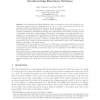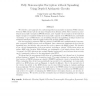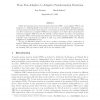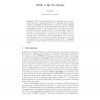IACR
2011
12 years 4 months ago
2011
GOST is a well known block cipher which was developed in the Soviet Union during the 1970’s as an alternative to the US-developed DES. In spite of considerable cryptanalytic eff...
IACR
2011
12 years 4 months ago
2011
Generic decoding of linear codes is the best known attack against most code-based cryptosystems. Understanding and measuring the complexity of the best decoding technique is thus n...
IACR
2011
12 years 4 months ago
2011
Zero knowledge sets (ZKS) [18] allow a party to commit to a secret set S and then to, non interactively, produce proofs for statements such as x ∈ S or x /∈ S. As recognized in...
IACR
2011
12 years 4 months ago
2011
The hardware-attractive block cipher family KTANTAN was studied by Bogdanov and Rechberger who identified flaws in the key schedule and gave a meet-in-the-middle attack. We revis...
IACR
2011
12 years 4 months ago
2011
We aim at constructing adaptive oblivious transfer protocols, enjoying fully simulatable security, from various well-known assumptions such as DDH, d-Linear, QR, DCR, and LWE. To t...
IACR
2011
12 years 4 months ago
2011
Protocols for generic secure multi-party computation (MPC) come in two forms: they either represent the function being computed as a boolean circuit, or as an arithmetic circuit o...
IACR
2011
12 years 4 months ago
2011
The Keccak hash function is one of the five finalists in NIST’s SHA-3 competition, and so far it showed remarkable resistance against practical collision finding attacks: Afte...
IACR
2011
12 years 4 months ago
2011
IACR
2011
12 years 4 months ago
2011
Unlike the standard notion of pseudorandom functions (PRF), a non-adaptive PRF is only required to be indistinguishable from random in the eyes of a non-adaptive distinguisher (i....
IACR
2011
12 years 4 months ago
2011
KISS (‘Keep it Simple Stupid’) is an efficient pseudo-random number generator originally specified by G. Marsaglia and A. Zaman in 1993. G. Marsaglia in 1998 posted a C versio...




